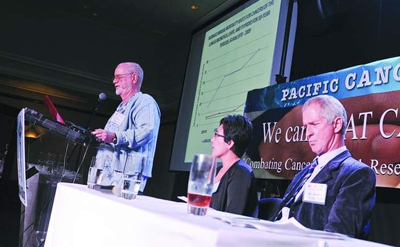
Rising cancer rates: Dr. Robert Haddock, left, talks about the annual rising number of cancer cases during a panel discussion of environmental carcinogens during the Pacific Cancer Conference at the Hyatt Regency Guam in Tumon, yesterday. The three-day conference is being held by the Cedars-Sinai Medical Center and the Guam Medical Association. Photo by Rick Cruz/Pacific Sunday News/rmcruz@guampdn.com
Cancer advances revealed
Published in the Pacific Daily News, Sept. 30, 2012
Written by Jerick Sablan of the Pacific Daily News
Dozens of local health professionals are learning about various cancers at the Pacific Cancer Conference being held this weekend.
A variety of lectures discussed issues including cancer and depression, cancer of the ear, nose, and throat, colorectal cancer, and prostate cancer. The conference is sponsored by the Guam Medical Association and the Cedars-Sinai Medical Center. The conference ends today.
One lecture was on a breast cancer -- which affects many families on island -- and new treatments to fight it.
Dr. William Audeh, medical director of the Samuel Oschin Cancer Center at Cedar-Sinai Medical Center, presented an update on breast cancer.
Audeh discussed the future of the treatment of breast cancer. He said new technologies are creating ways to treat breast cancer without chemotherapy.
Genetic tests
A complete genome sequencing of breast cancer is helping doctors determine the right treatment needed for a patient. The current system can be ineffective and toxic for some patients, Audeh said.
Audeh said molecular biology is the essence of cancer and testing at the molecular level helps determine the right treatment for a patient.
Audeh explained that women who have breast cancer usually go through chemotherapy as a safety precaution. However, some women don't get any benefit from chemotherapy and end up sick from a procedure they don't need.
With new genetic testing methods, doctors can know if a woman needs chemotherapy or another type of treatment, Audeh said.
"This is the only way to avoid toxicity of chemotherapy. The only way to improve is to integrate 21st century biology into the clinic," Audeh said.
One of his own patients, a 41-year-old woman with two young children and a job, didn't know how she would juggle her life and chemotherapy. Before the new test she would have been given chemotherapy as a precaution. But after testing, Audeh found that she didn't need it.
"I was able to prevent giving her chemotherapy," Audeh said.
He said the test is expensive, but it can even out in the long run because it could save women from paying thousands of dollars for chemotherapy treatment that wouldn't be of any benefit.
New medicines
New medicines being developed to fight breast cancer are currently in the works.
One drug call T-DMI is a drug combination designed to act like a "smart bomb," which delivers its medicine directly to tumor cells while reducing collateral damage to the rest of the body.
The drug would target specific tumors decreasing the amount of damage from cancer treatment, Audeh said.
Further trials are needed before the U.S. Food and Drug Administration can approve it.
Audeh said the future in breast cancer treatment looks promising and a greater push for adequate medicine and treatment is needed to help reduce the number of breast cancer deaths.